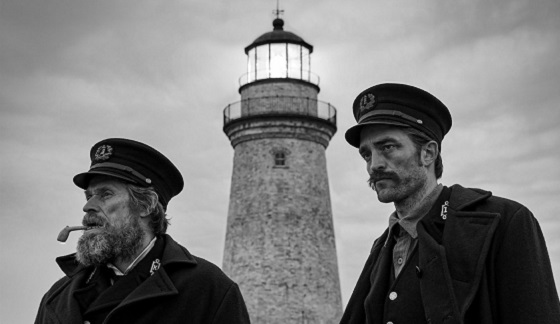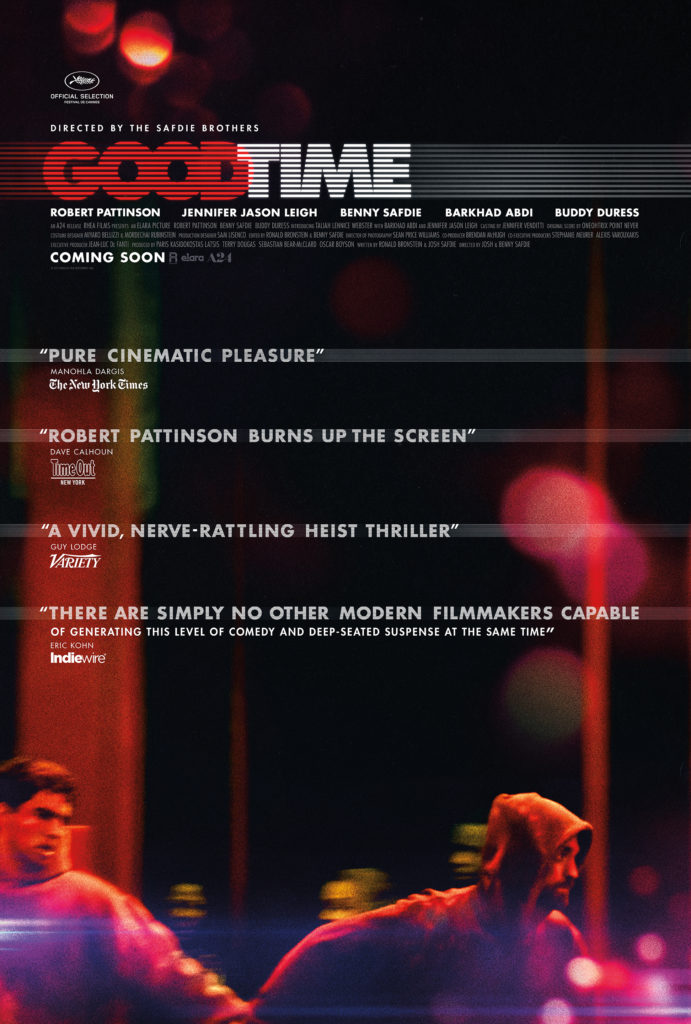Starring: Willem Dafoe and Robert Pattinson
Directed by: Robert Eggers
Rated: R
Running Time: 109 minutes
A24
When “The Lighthouse” opens, we watch as two lighthouse keepers sourly look towards a tiny island dotting the vast ocean ahead. Towering above the horizon is the lighthouse that they’ll be in charge of for the next four weeks. We won’t learn who these lighthouse keepers are, much less their names, until much later in the movie. That’s because both don’t know each other or seem concerned about exchanging pleasantries. The younger lighthouse keepers, Ephraim Winslow (Pattinson), is given the more strenuous duties on the miniature island, while the older lighthouse keepers, Thomas Wake (Dafoe), mysteriously secludes himself in the lighthouse.
Taking place in the late 19th century, Wake, a curmudgeonly veteran of the lighthouse trade, holds on to several superstitions, which he rambles on about like its Sunday gospel. He warns his counterpart about bothering or harming the seagulls that permeate the island because the pesky seabirds house the souls of dead sailors. We also hear from him that the previous lighthouse keeper went mad, claiming to have been beckoned by the call of nearby sirens. Winslow, who’s initially suspicious of his superior and the tales he tells, finds a mermaid token stuffed into his mattress as he settles in. That seems to trigger an avalanche of bizarre happenings and sights on the miniscule space of land.
“The Lighthouse” finds a multitude of reasons for these lighthouse keepers to go inevitably go mad. Everything from cabin fever and mistrust, to the mass consumption of alcohol and the reality that their four weeks may become longer as a storm approaches. As the film progresses, it’s difficult to tell which lighthouse keeper is telling the truth, which one is hallucinating, and what exactly is happening, if anything, on the island. Dread drips throughout this film, thanks to a bombastic soundtrack and the movie being filmed in black and white. The terrors of the night and day are enhanced by the monochromatic landscape and sets.
On a technical level, this film is hauntingly gorgeous. When we see the lighthouse at night, we expect a monster to be perched on top, but instead it’s Wake, who appears to be bewitched by the light he claims to protect. When Winslow moves about the island with his work duties, whether it’s during blustery rain storms or in the dead of night, it feels lonely and isolated because all he has are his thoughts and visions. Neither have anything to attach themselves to, other than their work, especially since neither appears to have a busy work hobby, much less a book. Yet if something is on the island with them, we know that Winslow and Wake have no way to escape.
“The Lighthouse” manages to feel claustrophobic despite all the space given to these actors to play in. Despite their tiny lodging, they appear to have all the room in the world when they need to yell at or lung at one another. Dafoe, a natural in acting, seems to go through the motions at the beginning, as if he’s stretching the sea legs of his conniving character. He shines as bright as a lighthouse in the final act though, specifically in one scene I won’t reveal and another where his character delivers a chilling soliloquy. Equally impressive is Pattinson, who has the heaviest lifting throughout as his character descends into madness. The nightmarish visions and back-breaking work eventually tears down Winslow’s tough guy persona at the beginning. Pattinson channels fear and paranoia through his piercing eyes.
As evidenced by some of the more horrific or horror-centric films of 2019, “Midsommar” and “Climax” come to mind, “The Lighthouse” is a movie that you let digest. Having a gut reaction afterwards would do a disservice to the craft presented on-screen. As a reviewer, I’m in a pinch because a second viewing would solidify my overall attitude towards this film, but I do know that my initial experience was positive. Even though we’re trapped with these characters for nearly two hours, the film never feels long because it’s unnerving. Director Robert Eggers finds the right moments to be overtly creepy, violent and sexual, just like he did in his previous film, “The Witch.” There are also numerous light moments of humor that help undercut a lot of the palpable tension. “The Lighthouse” won’t make you jump or have you turning on a night light when you get home, but it may haunt your dreams like any good campfire tale of terror.



